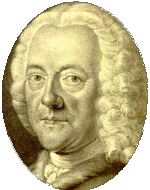

German composer. He received instruction in Latin, rhetoric, and dialectic at the Altstädtisches Gymnasium and the Domschule in Magdeburg. His music master was the Kantor Benedikt Christian, whose compositions he transcribed; by the age of 10 he had teamed to play the violin, the flute, the zither, and keyboard instruments. At the age of 12 he began composing an opera, prompting his mother, who wished him to study law, to forbid him to continue his musical studies. In late 1693 or 1694 he was sent to school at Zellerfield and placed under the care of the superintendent, Caspar Calvoer. Calvoer instructed Telemann in music theory and approved of the boy's teaching himself composition and thoroughbass. Telemann remained there for four years before moving to the Gymnasium Andreanum at Hildesheim. There he composed incidental songs for Latin school dramas, became involved in performances of German cantatas, and made visits to Hannover and Brunswick, where he became exposed to French instrumental music and Italian opera.
In 1701 he entered Leipzig Univ. with the intent of studying law; he organized a student collegium musicum there in 1702. Also in that year he was appointed music director of the Leipzig Opera, where he used students in productions. In 1704 he became organist at the Neue Kirche, and the following year he was appointed Kapellmeister to the court of Count Erdmann II of Promnitz at Sorau. Several visits to Poland acquainted him with Polish folk music, which he admired greatly. In 1708 or 1709 he moved to Eisenach to assume the duties of Konzertmeister and later Kapellmeister. For the orchestra he composed French overtures, concertos, and chamber works; for the Hofkapelle he supplied church cantatas and occasional music. It was there that he probably met J. S. Bach; he was godfather to C. P. E. Bach in 1714. In 1709 he married Louise Eberlin; she died in January 1711. The following year he became the city director of music at Frankfurt am Main and Kapellmeister at the Barfüsserkirche. There he trained choristers, wrote at least five cycles of cantatas, and supplied occasional music. He also directed weekly public concerts at which his oratorios and instrumental works were performed. In 1714 he married Maria Katharina Textor, with whom he had eight sons and two daughters. In 1717 he became Kapellmeister at Gotha, and on 16 October 1721 he was appointed Kantor of the Johanneum in Hamburg and music director of the city's five main churches. Although the latter position placed considerable demands on Telemann, he still found time to conduct a collegium musicum in public concerts and take part in operatic productions; from 1722 to 1738 he was music director of the Hamburg Opera. From his time in Frankfurt until 1740 Telemann himself published a great many of his works, including sacred cantatas and the three-part Musique de table. In 1737 he went to Paris, probably to prevent pirated editions of his music from being published; his works were performed to great acclaim at court and at the Concert spirituel. Like Handel, he turned in his later years to the oratorio.